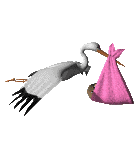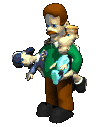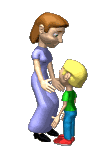

June 30, 2004
Raising Children
 Raising children is trickier than producing them. When they are first born they think that the world and everything in it exists to serve their needs. It is your job to make sure they are not disappointed. They are frightened; you hold them. They are sleepy; you rock and sing to them. They are wet and dirty; you clean them. They are hungry; you feed them. They are sick; you comfort them. You know the rest. Surprisingly, some of these basic parent-child connections persist for a lifetime, and may even survive you.
Raising children is trickier than producing them. When they are first born they think that the world and everything in it exists to serve their needs. It is your job to make sure they are not disappointed. They are frightened; you hold them. They are sleepy; you rock and sing to them. They are wet and dirty; you clean them. They are hungry; you feed them. They are sick; you comfort them. You know the rest. Surprisingly, some of these basic parent-child connections persist for a lifetime, and may even survive you.
As soon as infants begin to explore the world (which is almost right away) your job description grows. Now you must guide and teach as well as care for. Most of what your children learn from you will be by means of your example. There is precious little you can do about that, except try to conceal as many of your bad habits from them as you can. This seldom works. Occasionally, they will emulate one of your good qualities. This can be quite rewarding. A word of caution: part of learning must be experienced first hand. Take the "Don't touch the hot stove!" lesson for example. With my firstborn we foolishly thought that with constant surveillance from my wife and me we could prevent it happening. She burned her hand. With the second child we used the "Stove Hot!" theory of learning (which probably made the touching inevitable). He burned his hand. With the last one I would hold her and reach out as if to touch the burner; then I would feign injury and pain and dance around yelling ouch, etc. When she burned her hand it was a less severe injury than the other kids. The point is that none of the children burn their hand on the stove more than once, and it is not fatal.


With adolescence and the teen years we enter the Dark Ages of child rearing. Your child has now learned all there is worth knowing about real life whilst you, the parental unit, are arrested in a much earlier paradigm. You are clueless about what is really important, and are hopelessly out of touch with what is going on. Your sole function is to embarrass your offspring in front of friends, and even at times with strangers. The trick during this period is to provide comfort, and to refrain from offering gratuitous advice. Listen, empathize, console, but resist as best you can the strong urge to pontificate. In the unlikely event your teen asks you for advice, give it. Otherwise, realize that by offering an unsolicited opinion you may foreclose the best option that your child may have. Take some solace in the certain knowledge that you treated your parents in just as shabby a way when you were that age. It is payback time.
Did I forget to mention love? Tina Turner sings, "What's love got to do with it?" (It's just a second-hand emotion). Well, in this case, everything. No matter how many mistakes you make, or how miserably you perform as a parent at any stage of your children's development, as long as you really love them and don't make a secret of it, they will probably turn out OK.
My Mom could sum up all that advice on child rearing in one sentence. She would say, "The children survive, in spite of our best efforts." As usual, she was right on.
 to Journal Main Page
to Journal Main Page
